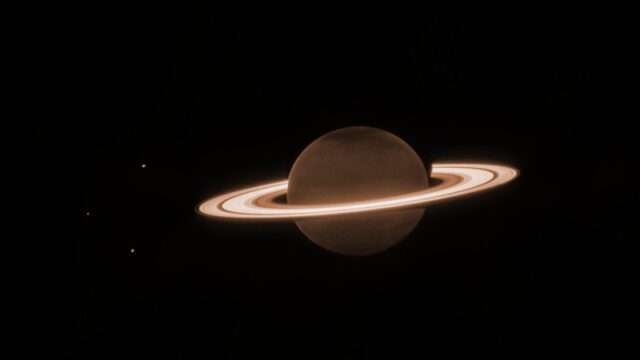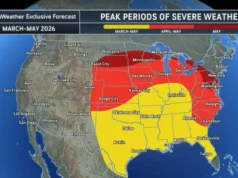
The first official photo of Saturn from the James Webb Space Telescope (JWST) does not disappoint.
On Friday (June 30), NASA released a stunning JWST image that shows the ringed planet in a whole new light. The photo, captured on June 25 by the observatory’s NIRCam (Near-Infrared Camera) instrument, “is already fascinating researchers,” NASA officials said in an image description.
“Saturn itself appears extremely dark at this infrared wavelength observed by the telescope, as methane gas absorbs almost all of the sunlight falling on the atmosphere,” they added. “However, the icy rings stay relatively bright, leading to the unusual appearance of Saturn in the Webb image.”
Related: Saturn: Everything you need to know about the sixth planet from the sun

While Saturn’s rings are the clear star of the new photo, it also highlights Enceladus, Dione and Tethys, three of Saturn’s 145 known moons.
Enceladus is of particular interest to astrobiologists, because the satellite is thought to possess an ocean of liquid water beneath its icy shell. The moon blasts some of its subsurface water out into space via geysers near its south pole, dramatic features discovered by NASA’s Cassini probe back in 2005 and observed recently by JWST.
JWST was designed to peer into deep time, giving astronomers looks at some of the universe’s first stars and galaxies. But, as the new Saturn shot shows, the observatory can eye objects much closer to home as well.
Indeed, the $10 billion telescope has also snapped amazing photos of Uranus and given us great views of Jupiter and its polar auroras. And JWST is just getting started: The observatory launched on Dec. 25, 2021 and began science operations last summer.
Disclaimer
Artificial Intelligence Disclosure & Legal Disclaimer
AI Content Policy.
To provide our readers with timely and comprehensive coverage, South Florida Reporter uses artificial intelligence (AI) to assist in producing certain articles and visual content.
Articles: AI may be used to assist in research, structural drafting, or data analysis. All AI-assisted text is reviewed and edited by our team to ensure accuracy and adherence to our editorial standards.
Images: Any imagery generated or significantly altered by AI is clearly marked with a disclaimer or watermark to distinguish it from traditional photography or editorial illustrations.
General Disclaimer
The information contained in South Florida Reporter is for general information purposes only.
South Florida Reporter assumes no responsibility for errors or omissions in the contents of the Service. In no event shall South Florida Reporter be liable for any special, direct, indirect, consequential, or incidental damages or any damages whatsoever, whether in an action of contract, negligence or other tort, arising out of or in connection with the use of the Service or the contents of the Service.
The Company reserves the right to make additions, deletions, or modifications to the contents of the Service at any time without prior notice. The Company does not warrant that the Service is free of viruses or other harmful components.












